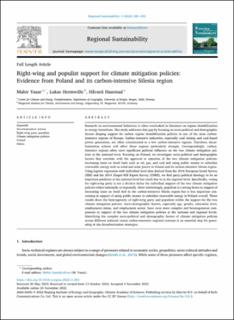| dc.contributor.author | Yazar, Mahir | |
| dc.contributor.author | Hermwille, Lukas | |
| dc.contributor.author | Haarstad, Håvard | |
| dc.date.accessioned | 2023-02-16T11:44:55Z | |
| dc.date.available | 2023-02-16T11:44:55Z | |
| dc.date.created | 2022-11-30T13:30:35Z | |
| dc.date.issued | 2022 | |
| dc.identifier.issn | 2097-0129 | |
| dc.identifier.uri | https://hdl.handle.net/11250/3051461 | |
| dc.description.abstract | Research on environmental behaviour is often overlooked in literature on regime destabilization in energy transitions. This study addresses that gap by focusing on socio-political and demographic factors shaping support for carbon regime destabilization policies in one of the most carbon-intensive regions of Europe. Carbon-intensive industries, especially coal mining and coal-based power generation, are often concentrated in a few carbon-intensive regions. Therefore, decarbonization actions will affect those regions particularly strongly. Correspondingly, carbon-intensive regions often exert significant political influence on the two climate mitigation policies at the national level. Focusing on Poland, we investigate socio-political and demographic factors that correlate with the approval or rejection of the two climate mitigation policies: increasing taxes on fossil fuels such as oil, gas, and coal and using public money to subsidize renewable energy such as wind and solar power in Poland and its carbon-intensive Silesia region. Using logistic regression with individual-level data derived from the 2016 European Social Survey (ESS) and the 2014 Chapel Hill Expert Survey (CHES), we find party-political ideology to be an important predictor at the national level but much less so at the regional level. Specifically, voting for right-wing party is not a divisive factor for individual support of the two climate mitigation policies either nationally or regionally. More interestingly, populism is a strong factor in support of increasing taxes on fossil fuel in the carbon-intensive Silesia region but is less important concerning in support of using public money to subsidize renewable energy in Poland overall. These results show the heterogeneity of right-wing party and populism within the support for the two climate mitigation policies. Socio-demographic factors, especially age, gender, education level, employment status, and employment sector, have even more complex and heterogeneous components in support of the two climate mitigation policies at the national and regional levels. Identifying the complex socio-political and demographic factors of climate mitigation policies across different national versus carbon-intensive regional contexts is an essential step for generating in situ decarbonization strategies. | en_US |
| dc.language.iso | eng | en_US |
| dc.publisher | Elsevier | en_US |
| dc.rights | Navngivelse 4.0 Internasjonal | * |
| dc.rights.uri | http://creativecommons.org/licenses/by/4.0/deed.no | * |
| dc.title | Right-wing and populist support for climate mitigation policies: Evidence from Poland and its carbon-intensive Silesia region | en_US |
| dc.type | Journal article | en_US |
| dc.type | Peer reviewed | en_US |
| dc.description.version | publishedVersion | en_US |
| dc.rights.holder | Copyright 2022 Xinjiang Institute of Ecology and Geography, Chinese Academy of Sciences | en_US |
| cristin.ispublished | true | |
| cristin.fulltext | original | |
| cristin.qualitycode | 1 | |
| dc.identifier.doi | 10.1016/j.regsus.2022.11.001 | |
| dc.identifier.cristin | 2085726 | |
| dc.source.journal | Regional Sustainability | en_US |
| dc.source.pagenumber | 281-293 | en_US |
| dc.relation.project | EU – Horisont Europa (EC/HEU): 884539 | en_US |
| dc.identifier.citation | Regional Sustainability. 2022, 3 (4), 281-293. | en_US |
| dc.source.volume | 3 | en_US |
| dc.source.issue | 4 | en_US |

